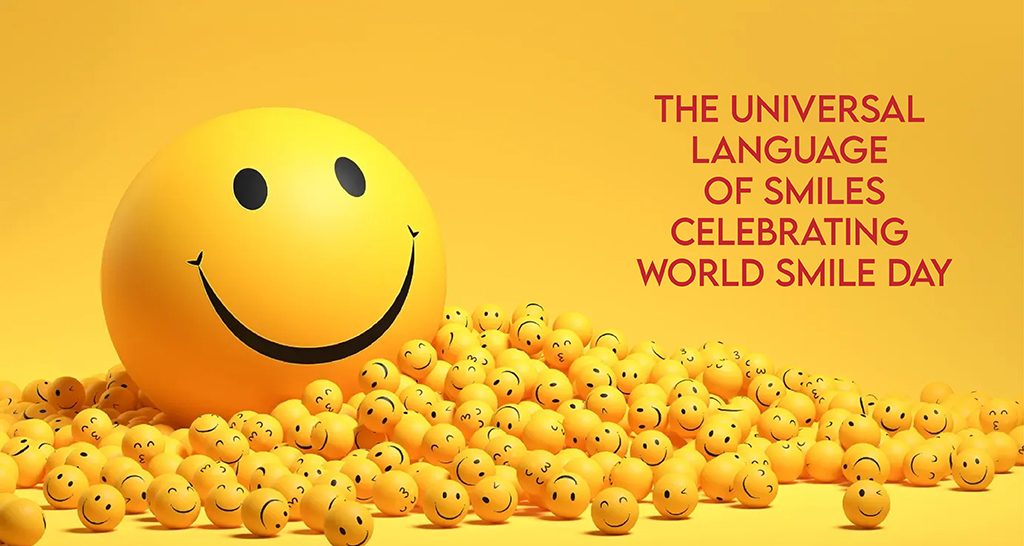In a world full of challenges, a smile shines as a symbol of hope and connection. As Mother Teresa said, “Peace begins with a smile.” This idea is at the core of World Smile Day, celebrated every first Friday of October. It’s a day devoted to spreading kindness and happiness through smiles, a language everyone understands.
The Origin of World Smile Day: World Smile Day began in 1999, thanks to Harvey Ball, the creator of the smiley face. Its goal is simple: to inspire kindness and smiles globally. It reminds us how a smile can profoundly affect both the person giving it and the one receiving it.
The Significance of Smiles: A genuine smile is incredibly powerful. It not only makes us happy but also brings light to others’ darkest days. Smiles repair relationships, connect strangers, and cross cultural boundaries. They celebrate joy and provide comfort in sadness. A smile is a gift, expressing our inner light, and has the potential to change the world, one cheerful smile at a time.
The Science Behind Smiles: Research has shown that smiling triggers a chemical reaction in the brain, releasing feel-good chemicals like dopamine and serotonin, even when we force a smile. Moreover, the physical benefits of smiling are astonishing; it lowers heart rate and cortisol levels, contributing to a longer and more relaxed life.
The Diversity of Smiles: Smiles, like human emotions, come in different types. Researchers have found 19 distinct smiles, from polite to genuinely happy. Whether embarrassed or loving, each smile expresses a unique emotion, revealing the depth of human connection through facial expressions.
Celebrating World Smile Day: On October 6th, people worldwide celebrate World Smile Day. It’s more than a date, it is a reminder of our ability to brighten someone’s day. Smile at strangers, encourage others to smile, be kind, and spread joy. Share smile stories on social media, and volunteer to make a lasting impact in the community.
Smiling has many health and mental benefits, including:
- Reduction of Stress: Smiling triggers the release of endorphins, which are natural stress relievers. It also decreases the stress hormone cortisol, helping you feel more relaxed.
- Lowered Blood Pressure: Smiling can lead to a temporary decrease in blood pressure. With time, this can lead to a healthier heart.
- Boosted Immune System: The positive feelings associated with smiling and laughing strengthen the immune system, making the body better fight off illnesses.
- Pain Relief: Endorphins released while smiling act as natural painkillers. They can alleviate chronic pain and make you feel better.
- Improved Mood: Smiling releases dopamine, serotonin, and endorphins, contributing to feeling happier and more content.
- Better Relationships: Smiling is contagious. It stimulates positive communication. It can help build and strengthen relationships, both personally and professionally.
- Stress Reduction: Smiling can act as a coping mechanism during stressful situations, helping to relax facial muscles and reduce overall tension.
- Enhanced Confidence: Smiling makes you appear more approachable and confident, positively influencing your social and professional interactions.
- Increased Lifespan: Studies have shown that people who smile often tend to live longer, healthier lives.
- Improved Mental Health: Regular smiling and laughter can reduce symptoms of depression and anxiety, promoting better mental health.
Smiling not only improves your mood and the mood of those around you but also contributes significantly to your overall health and well-being. It is a simple yet powerful tool that can be utilized daily to enhance physical and mental health.
Conclusion: In the words of Maya Angelou, “If you have only one smile in you, give it to the people you love.” World Smile Day proves that smiles can heal and unite people, making the world kinder, even in tough times. So, on this World Smile Day, let us unite in the spirit of kindness, share our smiles generously, and contribute to making the world a better place, one heartfelt smile at a time.







